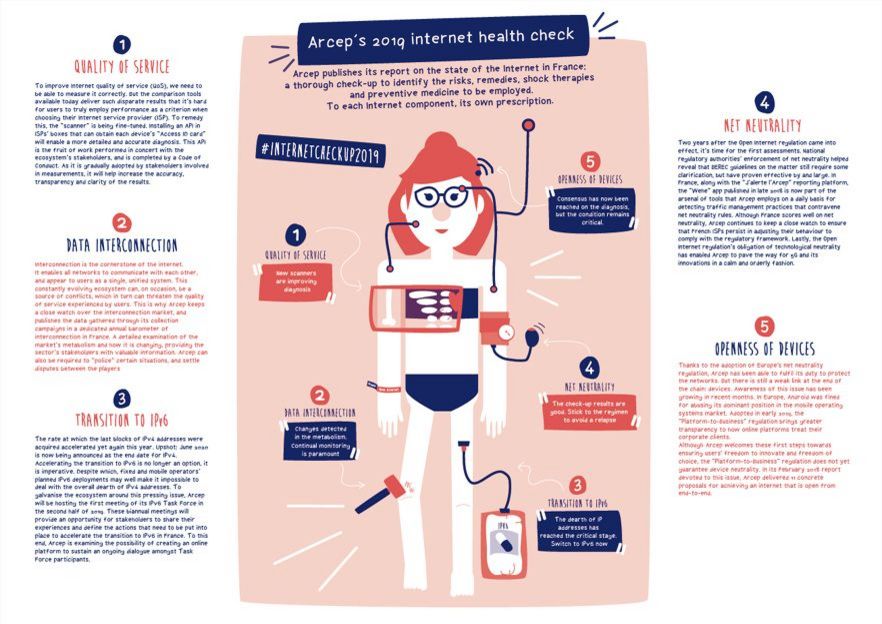Arcep is publishing the 2019 edition of its report on the state of the internet in France. Submitted to Parliament and presented to the media and sector experts today, this report highlights the actions that have been taken to ensure internet openness, explores potential threats and lays out what steps the regulator is taking to contain them.
The internet as a “common good”
The report performs a thorough check-up of the different components of fixed and mobile internet networks: quality of service, data interconnection, the transition to IPv6, net neutrality and the openness of devices. Arcep assesses the “internet’s health” by establishing a diagnosis for each component for the year gone by, and identifies both the risks at hand and remedies to be put into place. To what purpose? To ensure that the internet continues to develop as a common good, with users as the sole arbiter.
Internet quality of service: five measuring tools have declared themselves in compliance with Arcep’s Code of conduct
To improve quality of service on the internet, we first need to be able to measure it. Having observed that comparison engines were far from homogenous, and that it was impossible for users to employ performance and a real criterion when choosing their ISP, Arcep initiated a co-construction approach that brings together all of the players involved in testing and measuring, along with operators and researchers. This work enabled Arcep to publish a Code of conduct last December for players that offer tools for measuring the quality of fixed and mobile internet networks.
This Code of conduct sets out all of the best practices that encourage players to:
- accentuate transparency on their methodological choices, so that any third party can analyse their results;
- do away with any questionable practices, in terms of both test protocols and published findings.
With the publication of this 2019 edition of its report on the state of the internet in France, Arcep is announcing the five tools that have declared themselves in compliance with the Code of conduct for measuring fixed and mobile internet quality of service: nPerf, Speedtest UFC-Que Choisir (developed by UFC-Que Choisir), DébiTest 60 (the internet speed test from 60 millions de consommateurs), 4GMark (developed by QoSi) and IPv6-test.
As available IPv4 addresses are expected to run out by 2020, the transition IPv6 is imperative
Up until now, the internet has relied on the IPv4 protocol to function, which was set to be gradually replaced by IPv6 [1]. Arcep provides the public with an ongoing progress report in its barometer of the transition to IPv6 in France. The depletion of available IPv4 addresses has already driven up their price significantly, which is likely to create a barrier to entry that will penalise new internet companies. Arcep now predicts that the supply of available IPv4 addresses will be exhausted by June 2020. To support this transition, Arcep is helping foster a dialogue amongst community members, to allow existing players to exchange best practices. To this end, a dedicated IPv6 Task Force will be created in the second half of 2019. The purpose is not solely technical, but may also help authorities identify those committing infractions.
Guaranteeing an open internet
Arcep is the net neutrality watchdog in France, and provides a detailed account of its actions in the report. It is also committed at the European level, and plays an active role in BEREC discussions on the clarifications that may need to be brought to the guidelines that were adopted in 2016, to help stakeholders in their application of Europe’s Open Internet regulation.
Arcep has also helped to raise awareness amongst industry players and users on the issues surrounding the openness of devices. If European law sets out the actions that can be taken with respect to content and applications at the infrastructure level (on telecoms networks), it provides no guarantees on users’ gateway to the internet, namely devices. Even though real strides were made on device regulation last year (notably thanks to the Platform-to-Business regulation), there is a greater need than ever before to supervise device-related practices, to be able to ensure an “open internet from end to end,” particularly now with the development of smart speakers and connected cars.
The internet’s check-up results at a glance
____________________________
[1] N.B. the conclusions and work referred to in this press release pertain only to internet networks, and do not apply to private interconnection between two companies, notably the interconnection of two operators’ networks for voice call termination over IP.

